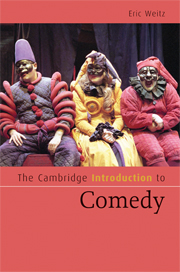Book contents
- Frontmatter
- Contents
- List of illustrations
- Preface
- Introduction: Thinking about comedy
- Chapter 1 Reading comedy
- Chapter 2 Comedy's foundations
- Chapter 3 Comedy's devices
- Chapter 4 Comedy in the flesh
- Chapter 5 Comedy's range
- Chapter 6 Comedy and society
- Notes
- Further reading
- List of texts
- Bibliography
- Index
- Cambridge Introductions to …
Chapter 3 - Comedy's devices
Published online by Cambridge University Press: 05 September 2014
- Frontmatter
- Contents
- List of illustrations
- Preface
- Introduction: Thinking about comedy
- Chapter 1 Reading comedy
- Chapter 2 Comedy's foundations
- Chapter 3 Comedy's devices
- Chapter 4 Comedy in the flesh
- Chapter 5 Comedy's range
- Chapter 6 Comedy and society
- Notes
- Further reading
- List of texts
- Bibliography
- Index
- Cambridge Introductions to …
Summary
Towards a study of comic traits
Our treatments of Old and New Comedy sought to illuminate the conditions under which comic form as we know it coalesced. This earliest recorded evidence of ‘writing comedy’ shows the extent to which a text bears traces of the conditions surrounding its original creation. It should be remembered, however, that the dramatic text represents a cultural artefact notable for its defining element of incompleteness. The words are only ever the tip of a virtual iceberg, and their concretization in performance remains subject to the constant flux of theatre practice. We can make suppositions about the ways in which a textual pattern from Classical Greek comedy ‘asks’ to be performed, but it is important to remember that we cannot help reading it through the prism of our own theatre-making and theatre-viewing experiences. As we have seen, a contemporary reader may be quite unaware of meanings, resonances and implications which are owing to theatre practices or sociocultural circumstances of the time.
While acknowledging what might appear to be an unbridgeable gap of time and culture, it is, however, remarkable that comic form and content appear in key ways to transcend the experiential expanse separating a modern reader (and practitioner) from a text's historic origins. Characters, situations, human impulses and social dynamics are capable of giving an impression of timeless relevance despite their localized details.
- Type
- Chapter
- Information
- The Cambridge Introduction to Comedy , pp. 63 - 92Publisher: Cambridge University PressPrint publication year: 2009



